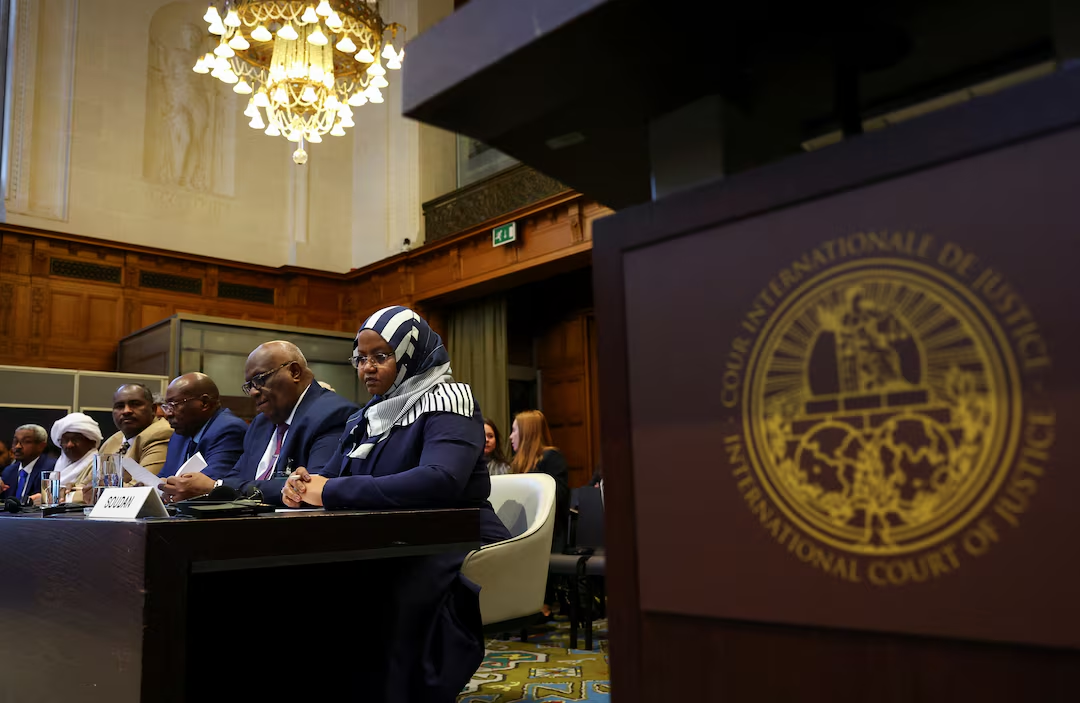By The Right Narrative Editorial Team
The Hague | April 10, 2025
In an unprecedented move, Sudan has taken the United Arab Emirates (UAE) to the International Court of Justice (ICJ), accusing the Gulf nation of violating the Genocide Convention by directly supporting the Rapid Support Forces (RSF) — the very paramilitary group accused of massacring the Masalit people in West Darfur.
The case, which began hearings today in The Hague, could fundamentally reshape international law, challenge Gulf state impunity, and redefine how the world handles state complicity in mass atrocities.
Darfur: A Genocide Reignited
Two decades after the first Darfur genocide shocked the world, another is unfolding in silence. Since April 2023, Sudan has been embroiled in a civil war between its national army and the RSF, a paramilitary force notorious for its brutality and origins in the Janjaweed militias.
What transpired in West Darfur, according to Sudanese officials and international observers, is nothing short of genocide. The RSF and allied Arab militias launched a campaign of ethnic cleansing against the non-Arab Masalit community in El Geneina and beyond — committing mass killings, systematic rape, and forced displacement.
In January 2025, the United States officially designated these atrocities as genocide. Sudan is now asking the world’s highest court to do the same — and to hold the UAE accountable for enabling them.

Sudan’s Case: “The UAE Armed the Genocide”
Sudan’s legal team, speaking before ICJ judges, laid out a bold and sobering argument: that the UAE was not merely an uninvolved bystander but a key enabler of genocide through direct military and logistical support to the RSF.
Their evidence includes:
- Flight logs of UAE cargo planes landing in Chad, close to RSF supply routes.
- Satellite images showing weapons transfers traced back to UAE-linked sources.
- Testimony and UN documentation detailing the flow of arms, drones, and supplies from Emirati-controlled operations to RSF forces.
“The UAE is fueling this war machine. The genocide in Darfur is not only being carried out by the RSF, but also by those who supply, fund, and protect them,” said Sudan’s lead counsel.
Sudan is urging the court to issue emergency provisional measures — essentially a legal cease-and-desist — that would force the UAE to immediately stop arming the RSF.
UAE’s Defense: Denial and Deflection
The UAE has categorically denied the accusations. Its delegation argued that:
- The allegations are politically motivated, designed to shift focus from Sudan’s internal failures.
- There is no concrete evidence linking UAE aid to genocide.
- Critically, the UAE signed the Genocide Convention with a legal reservation that blocks ICJ jurisdiction in such cases unless the UAE consents — which it has not.
This jurisdictional caveat may prove decisive. If the court upholds the UAE’s reservation, the case could be dismissed before it even begins — a potentially devastating blow to genocide prevention worldwide.
The Stakes: More Than Just Sudan
This is not just a legal battle between two nations. It’s a test of the entire international justice system.
If Sudan succeeds:
- It could mark the first time a state is held liable at the ICJ for enabling a genocide through proxy support.
- It would set a global precedent for accountability in modern hybrid warfare, where states fund militias to do their bidding.
- It could unleash diplomatic consequences for the UAE — including arms embargoes, sanctions, and reputational fallout.
If the UAE wins on jurisdictional grounds:
- It would expose a critical loophole in the Genocide Convention.
- Other nations with similar reservations could be emboldened to fund or arm militias with impunity, knowing international law won’t touch them.
- It would be a devastating signal to the victims in Darfur — and a clear message that the world protects the powerful, not the persecuted.
What’s Next?
The ICJ will first decide whether it has jurisdiction — a ruling expected in the coming weeks. If the court accepts Sudan’s request for provisional measures, it could immediately order the UAE to halt all forms of support to the RSF. A full ruling on the case’s merits, however, may take years.
In the meantime, the war rages on. El Fasher, the last stronghold of the Sudanese Army in Darfur, is under imminent threat from RSF forces. Humanitarian organizations warn that without intervention, another massacre is likely.
The Right Narrative’s Take
This case isn’t just about Sudan and the UAE — it’s about the future of international law. The world has long said “Never Again” after each genocide. But without accountability, those words ring hollow.
Sudan has dared to name names and demand justice. Whether the ICJ will listen — or whether legal loopholes will shield the powerful — will determine more than the fate of a nation. It will reveal the integrity of the international system itself.
Will justice prevail, or will power win again?
Stay with The Right Narrative as we continue to cover this case, expose the truth, and hold power to account.

